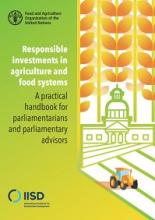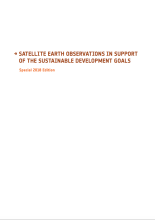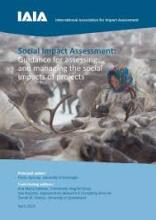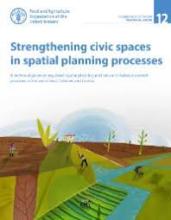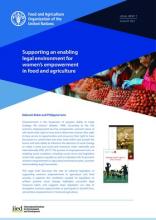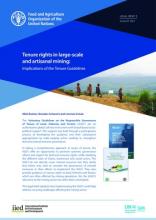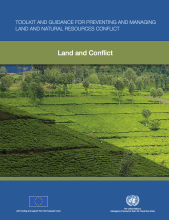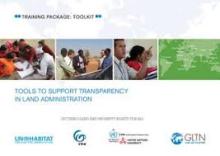Resources for Government
Responsible investments in agriculture and food systems – A practical handbook for parliamentarians and parliamentary advisors
This Handbook provides a comprehensive and systematic overview of the role that Parliamentarians and Parliamentary Advisors can play in the creation of reliable, coherent, and transparent “enabling environments” in the range of areas related to investment in agriculture and food systems. It does so through guidance notes, examples of good practices, and very practical indications, and sets out key stages of processes and mechanisms for MPs and advisors to consider while promoting responsible investment in agriculture and food systems.
Safeguarding land tenure rights in the context of agricultural investments: A technical guide for government authorities involved with the promotion, approval and monitoring of agricultural investments
This technical guide elaborates on specific aspects of the Voluntary Guidelines for the responsible Governance of Tenure (VGGT) relating to agricultural investments and provides detailed guidance to government authorities and others on actions they can take to help them to create an enabling environment for responsible and sustainable investments.
Satellite Earth Observations in Support Of The Sustainable Development Goals
This Handbook aims to explain how satellite Earth Observation (EO) are an essential tool in the development of the information and evidence required by many of the SDG Targets and Indicators.It has been prepared for national agencies, UN bodies and other SDG stakeholders working towards a collective implementation of the 2030 Agenda and towards a cost-effective response of countries to the SDG monitoring and reporting challenges.
Social Impact Assessment: Guidance for assessing and managing the social impacts of projects
This Guidance Note provides advice about what is expected in good practice social impact assessment (SIA) and social impact management processes, especially in relation to project development. It is intended for private sector actors, government agencies, development banks and agencies, civil society organisations, and service providers. It provides guidance to help reduce companies' risk exposure and assist them in being compliant with international standards and/or good practice as they evolve over time by addressing significant human rights issues associated with a project.
Stepping up: Protecting collective land rights through corporate due diliegence
This guide is intended to supplement other resources that provide broader overviews of human rights due diligence. It will be particularly helpful for downstream businesses or investors as they navigate how to identify, address, and track the impacts of their value chains on indigenous peoples. The guide will also be useful for policymakers as they design due diligence legislation.
Strengthening civic spaces in spatial planning processes
This technical guide provides strategies on how to strengthen, protect and promote legitimate tenure rights in spatial planning processes at the local, regional and national levels. It addresses state authorities involved in spatial planning processes, national governments and local authorities, and those operating on behalf of the state or within customary governance systems.
Supporting an enabling legal environment for women’s empowerment in food and agriculture
Empowerment is the “expansion of people’s ability to make strategic life choices”. According to the UN, women’s empowerment has five components: women’s sense of self-worth; their right to have and to determine choices; their right to have access to opportunities and resources; their right to have the power to control their own lives, both within and outside the home; and their ability to influence the direction of social change to create a more just social and economic order, nationally and internationally. The process of empowerment rests on enabling social conditions including social norms and legislative action that supports equality as well as individual will. To promote women’s empowerment in agriculture and food security, countries need enabling legal frameworks.
Tenure rights in large-scale and artisanal mining: Implications of the Tenure Guidelines
In taking a comprehensive approach to issues of tenure, the Voluntary Guidelines on the Responsible Governance of Tenure of Land, Fisheries and Forests (VGGT) offer an opportunity to promote systemic governance reform and respect for land and resource rights, while clarifying the different roles of States, businesses and social actors. The VGGT do not directly cover mineral resources but they clarify that States may wish to consider the governance of mineral resources in their efforts to implement the VGGT. They also provide guidance on tenure rights to land, fisheries and forests, which are often affected by mining operations. Yet, the VGGT’s relevance to the mining sector has often been overlooked.
This legal brief explores how implementing the VGGT could help address recurring challenges affecting the mining sector.
Toolkit and Guidance for Preventing and managing Land and Natural Resources Conflict - Land and Conflcit
This guidance note provides a framework for understanding and addressing land and natural resource-related grievances and conflicts through a holistic, systematic approach. While the main emphasis is on violent conflict, it may also be useful in a variety of other situations characterized by significant land-related grievances, but which are not currently or openly violent. It is intended for staff of multilateral organisations, national and local governments, and civil society organisations.
Tools to Support Transparency in Land Administration : Training Toolkit
This training toolkit aims to sensitize government agents about land administration, develop their capacity to address issues of corruption and to enhance transparency in the land sector. It focuses specifically on land administration with a view to filling the capacity development gap in the land administration sector. Training content covers key themes clustered into different training sessions related to land governance, transparency, land administration and tools that could help bring about transparency. It comes with a trainer's guide.


